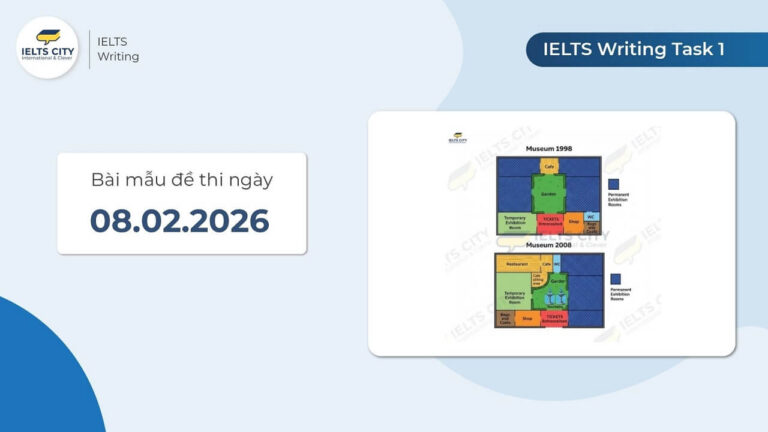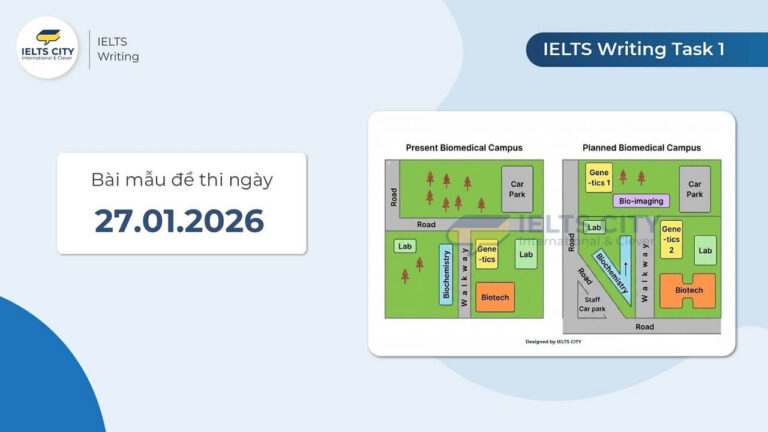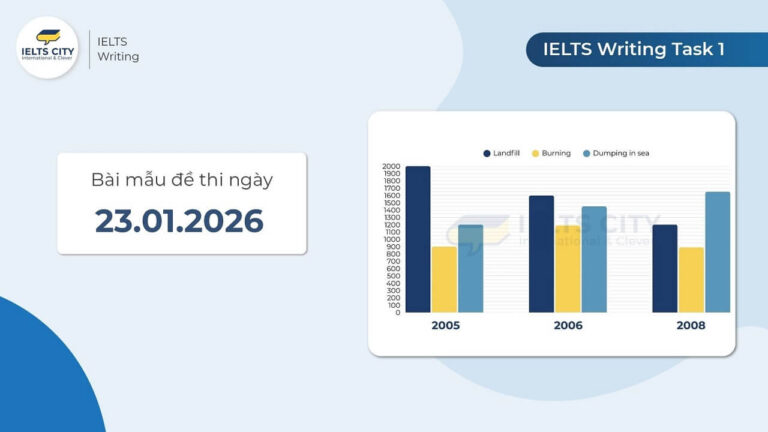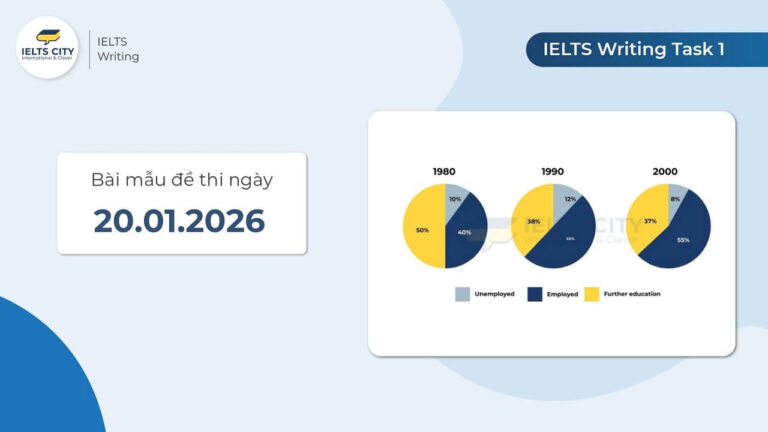Đề thi IELTS Writing Task 2 ngày 03.08.2024 là đề dạng Agree or Disagree về chủ đề Business. Đề bài này yêu cầu chúng ta nêu ý kiến về tác động tích cực của sự mở rộng của công ty đa quốc gia và toàn cầu hóa. Để xử lý tốt đề bài này, các bạn hãy cùng IELTS CITY phân tích đề bài và tham khảo bài mẫu 7.5+ phía sau nhé!

Nội dung chính
ToggleĐề thi IELTS Writing Task 2 ngày 03.08.2024
The expansion of multinational companies and increase in globalization produce positive effects for everyone. To what extent do you agree or disagree with this statement?
Dàn ý
Introduction:
- Briefly introduce the topic: The expansion of multinational companies and the increase in globalization. (Paraphrase đề bài)
- State your thesis: Globalization has both positive and negative impacts, and its benefits are not always evenly distributed.
- Preview your main points: You will discuss both the advantages and disadvantages of globalization.
Body Paragraph 1:
- Topic sentence: Globalization has facilitated trade and investment, leading to economic growth and job creation.
- Supporting points:
- Multinational companies invest in developing countries, bringing capital, technology, and expertise.
- These investments stimulate local industries and create employment opportunities.
- Increased competition spurred by globalization leads to innovation and improved product quality.
Body Paragraph 2:
- Topic sentence: However, the positive effects of globalization are not always evenly distributed.
- Supporting points:
- Multinational companies may exploit cheap labor in developing countries, leading to unfair working conditions and wage disparities.
- Globalization can contribute to the erosion of local cultures and traditions as global consumerism and homogenization take hold.
- The proliferation of fast-food chains and international brands can displace traditional cuisines and cultural practices, contributing to the erosion of local identities.
Conclusion:
- Restate your thesis: Globalization has both positive and negative impacts.
- Summarize your main points: Discuss the economic growth and interconnectedness facilitated by globalization as well as its potential drawbacks (exploitation of labor, erosion of local cultures, widening wealth gap).
- Call to action: Suggest a balanced approach, ensuring equitable distribution of benefits and mitigating negative consequences through regulations and ethical practices.
Hướng dẫn: Cách viết IELTS Writing Task 2
Sample Answer 7.5+
The expansion of multinational corporations and the surge in globalization have undeniably brought about profound changes to the global landscape. While these phenomena are often lauded for their positive effects on economies and societies, a more nuanced perspective reveals a complex reality characterized by both advantages and disadvantages. While globalization has certainly fostered economic growth and interconnectedness, its impact is not universally positive, and its benefits are not always evenly distributed.
On the one hand, globalization has facilitated trade and investment, leading to economic growth and job creation. Multinational companies, with their vast resources and global reach, often invest in developing countries, bringing in capital, technology, and expertise. These investments can stimulate local industries, create employment opportunities, and contribute to the overall economic development of these nations. Moreover, the free flow of goods and services across borders has led to increased competition, which in turn has spurred innovation and improved product quality.
However, the positive effects of globalization are not always evenly distributed. Critics argue that multinational companies often prioritize profit maximization over the well-being of local communities. They may exploit cheap labor in developing countries, leading to unfair working conditions and wage disparities. Additionally, globalization can contribute to the erosion of local cultures and traditions as global consumerism and homogenization take hold. For example, the proliferation of fast-food chains and international brands can displace traditional cuisines and cultural practices, contributing to the erosion of local identities.
In conclusion, while globalization has undoubtedly contributed to economic growth and facilitated global interconnectedness, its impact is not universally positive. The potential exploitation of labor, the erosion of local cultures, and the widening gap between the rich and the poor are significant drawbacks that need to be addressed. A balanced approach is crucial, ensuring that the benefits of globalization are distributed more equitably and that the negative consequences are mitigated through robust regulations and ethical practices.
Đăng ký nhận tư vấn miễn phí
Ưu đãi học phí lên đến 50%
& Cơ hội nhận học bổng trị giá 4.000.000 VNĐ
Đăng ký nhận tư vấn miễn phí
Ưu đãi học phí lên đến 50%
________
Từ vựng
- Laud (v): Ca ngợi, tán dương
- Nuanced (adj): Tinh tế, có nhiều sắc thái
- Facilitate (v): Hỗ trợ, tạo điều kiện thuận lợi
- Stimulate (v): Kích thích, thúc đẩy
- Disparity (n): Sự chênh lệch, sự bất bình đẳng
- Erosion (n): Sự xói mòn, sự suy yếu
- Homogenization (n): Sự đồng nhất hóa
- Proliferation (n): Sự gia tăng nhanh chóng, sự phát triển tràn lan
- Mitigate (v): Làm giảm, làm dịu
- Robust (adj): Mạnh mẽ, vững chắc
Bản dịch
Sự mở rộng của các công ty đa quốc gia và sự gia tăng của toàn cầu hóa đã chắc chắn mang lại những thay đổi to lớn cho cục diện toàn cầu. Trong khi những hiện tượng này thường được ca ngợi vì những tác động tích cực của chúng đối với nền kinh tế và xã hội, một góc nhìn tinh tế hơn lại hé lộ một thực tế phức tạp, được đặc trưng bởi cả những lợi thế và bất lợi. Mặc dù toàn cầu hóa đã thúc đẩy tăng trưởng kinh tế và sự kết nối toàn cầu, nhưng tác động của nó không phải lúc nào cũng tích cực, và lợi ích của nó không phải lúc nào cũng được phân phối đều.
Một mặt, toàn cầu hóa đã tạo điều kiện cho thương mại và đầu tư, dẫn đến tăng trưởng kinh tế và tạo việc làm. Các công ty đa quốc gia, với nguồn lực khổng lồ và phạm vi hoạt động toàn cầu, thường đầu tư vào các nước đang phát triển, mang lại vốn, công nghệ và chuyên môn. Những khoản đầu tư này có thể thúc đẩy các ngành công nghiệp địa phương, tạo ra cơ hội việc làm và góp phần vào sự phát triển kinh tế chung của các quốc gia này. Hơn nữa, dòng chảy tự do của hàng hóa và dịch vụ xuyên biên giới đã dẫn đến cạnh tranh ngày càng tăng, điều này đã thúc đẩy đổi mới và nâng cao chất lượng sản phẩm.
Tuy nhiên, những tác động tích cực của toàn cầu hóa không phải lúc nào cũng được phân phối đều. Các nhà phê bình lập luận rằng các công ty đa quốc gia thường ưu tiên tối đa hóa lợi nhuận hơn là phúc lợi của cộng đồng địa phương. Họ có thể khai thác lao động giá rẻ ở các nước đang phát triển, dẫn đến điều kiện làm việc bất công và bất bình đẳng về lương bổng. Ngoài ra, toàn cầu hóa có thể góp phần vào sự xói mòn văn hóa và truyền thống địa phương khi chủ nghĩa tiêu dùng toàn cầu và sự đồng nhất hóa chiếm ưu thế. Ví dụ, sự phát triển tràn lan của các chuỗi thức ăn nhanh và thương hiệu quốc tế có thể thay thế các món ăn truyền thống và các thực hành văn hóa, góp phần vào sự xói mòn bản sắc địa phương.
Kết luận, trong khi toàn cầu hóa chắc chắn đã góp phần vào tăng trưởng kinh tế và tạo điều kiện cho sự kết nối toàn cầu, nhưng tác động của nó không phải lúc nào cũng tích cực. Việc khai thác tiềm năng lao động, sự xói mòn văn hóa địa phương và khoảng cách ngày càng lớn giữa người giàu và người nghèo là những bất lợi đáng kể cần được giải quyết. Một cách tiếp cận cân bằng là điều cần thiết, đảm bảo rằng lợi ích của toàn cầu hóa được phân phối công bằng hơn và những hậu quả tiêu cực được giảm thiểu thông qua các quy định mạnh mẽ và thực hành đạo đức.
Cập nhật đề thi IELTS Writing mới nhất:
Cảm ơn các bạn đã theo dõi hết bài mẫu đề thi IELTS Writing Task 2 ngày 03.08.2024 là đề dạng Agree or Disagree band 7.5+ được biên soạn bởi IELTS CITY. Hy vọng bài mẫu trên sẽ giúp các bạn nắm cách triển khai ý trả lời hay và điểm cao. Chúc các bạn luyện thi IELTS hiệu quả và sớm đạt Target nhé!





















